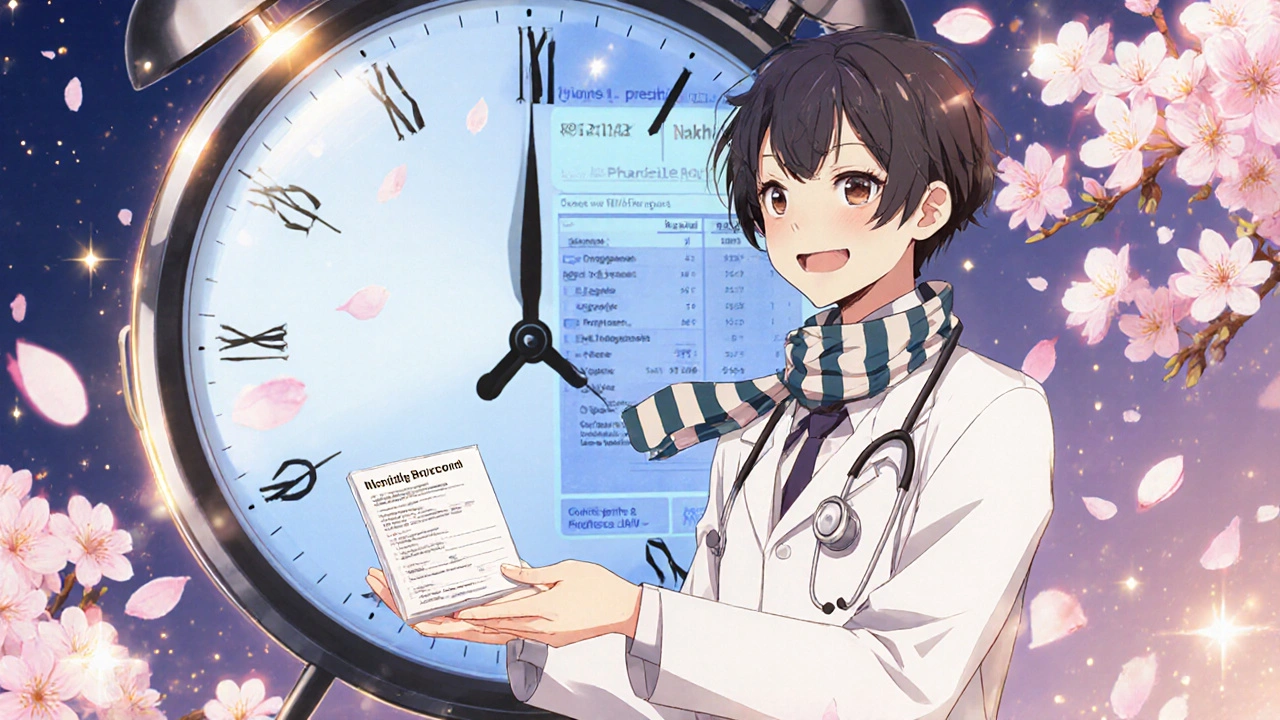Clozapine ANC Monitoring Schedule Calculator
Clozapine Monitoring Schedule Calculator
Calculate your ANC blood test schedule based on current FDA guidelines (no REMS required).
Your Monitoring Schedule
Select a start date to see your personalized ANC monitoring schedule.
Before February 24, 2025, getting clozapine wasn’t just about a prescription. It was a paperwork marathon. Patients had to get blood tests every week, every two weeks, then monthly. Prescribers had to be certified. Pharmacies had to verify results through a government portal. And every single time, before the medication could be filled, someone had to submit proof that the patient’s absolute neutrophil count (ANC) was safe. This wasn’t just inconvenient-it was a barrier. For many people with treatment-resistant schizophrenia, it meant waiting weeks, sometimes months, to start a drug that could save their life.
Why Clozapine Matters
Clozapine isn’t just another antipsychotic. It’s the most effective one for people who haven’t responded to at least two other medications. Studies show it works for 30% to 50% of those patients-far more than any other option. Yet, for decades, less than 13% of eligible patients in the U.S. ever got it. Why? Because of the REMS program.
Clozapine carries a real risk: severe neutropenia, a drop in white blood cells that can lead to life-threatening infections. In the 1980s, this risk led to the drug being pulled from the market. It came back in 1989 with strict monitoring rules. By 2015, those rules became a federally mandated system called the Risk Evaluation and Mitigation Strategy, or REMS. For nearly a decade, it controlled every step of clozapine use.
The Old REMS System: How It Worked
Under the old REMS program, three groups had to be certified: prescribers, pharmacies, and patients. Each had to register on the Clozapine REMS website. Prescribers had to complete training. Pharmacies had to prove they could verify ANC results. Patients had to sign up and agree to regular blood tests.
The ANC schedule was strict:
- Baseline test before starting
- Weekly tests for the first 6 months
- Every two weeks from 6 to 12 months
- Monthly after 12 months
And here’s the kicker: pharmacies couldn’t dispense clozapine unless they received a confirmed ANC result through the REMS portal. No result? No medication. Even if the patient had a recent normal blood test from their doctor, it didn’t count unless it was entered into the system.
There was also a monthly Patient Status Form that clinics had to fill out and submit. One 2022 survey found clinics spent an average of 3.2 hours a week just on REMS paperwork. Pharmacies added 10 to 15 minutes per prescription just to verify compliance. For rural clinics or small pharmacies, this was unsustainable.
Why the FDA Changed Course
In 2024, the FDA started a full review. They asked: Is this mandatory system still necessary? Or has the medical community learned to manage the risk on its own?
The answer came in February 2025: the mandatory REMS program is gone.
The FDA looked at data from the Sentinel System, the Department of Veterans Affairs, and Brigham and Women’s Hospital. They analyzed millions of blood test results, adverse event reports, and prescribing patterns. What they found surprised even some experts:
- Healthcare providers were already monitoring ANC levels at the recommended rates-even without being forced to.
- The risk of severe neutropenia is highest in the first 18 weeks, but remains low after that.
- Doctors and pharmacists were aware of the risk and had built monitoring into their routine practice.
The FDA concluded: the REMS program was no longer needed to keep patients safe. The medical system had adapted.

What’s Different Now?
As of February 24, 2025, you no longer need to be enrolled in the Clozapine REMS. You don’t need to submit ANC results to a federal database. Pharmacies don’t have to check a portal before filling the prescription.
But here’s what hasn’t changed:
- The boxed warning about severe neutropenia is still on every clozapine label.
- The recommended ANC monitoring schedule is still the same: weekly for 6 months, biweekly for months 6-12, then monthly.
- Prescribers are still expected to monitor ANC levels before each refill.
- Pharmacists are still expected to confirm the patient has had recent blood work.
The difference? Now it’s based on professional judgment and clinical guidelines-not federal enforcement.
What This Means for Patients
For patients, the change is huge.
Before, many people couldn’t start clozapine because their clinic didn’t have a REMS coordinator, or their pharmacy couldn’t handle the system. Some waited so long they gave up. One study found 30% of patients missed or delayed treatment because of REMS.
Now, the path is simpler. A doctor can prescribe clozapine. The patient gets their blood drawn at their local lab. The results go into their medical record. The pharmacist calls the clinic to confirm the ANC is safe-just like they do for any other high-risk medication.
There’s no more waiting for a portal to update. No more re-certification deadlines. No more forms to mail.
What This Means for Doctors and Pharmacies
For prescribers, the administrative burden is gone. No more logging into a separate REMS website. No more monthly forms. No more re-certifying every two years.
For pharmacies, especially small and rural ones, this is a game-changer. Before, many refused to fill clozapine because the system was too complex. Now, they can handle it like any other prescription-with standard checks and communication.
That’s why industry analysts predict a 25% to 30% increase in new clozapine starts over the next two years. The drug was already underused. Now, it’s finally becoming more accessible.

Is It Still Safe?
Yes. The FDA didn’t remove the risk. They removed the bureaucracy.
Severe neutropenia still happens-about 0.8% of patients, according to VA data. But it’s rare, and it almost always shows up early. That’s why the first 6 months still require weekly checks. That’s why doctors still need to know the numbers.
The FDA will keep watching. Through the Sentinel System, they’re still tracking neutropenia cases in real time. If things start to change, they can act. But for now, the data shows providers are doing the right thing without being forced to.
What Comes Next?
Professional organizations are updating their guidelines. The American Society of Health-System Pharmacists is launching new clinical recommendations in Q3 2025 to help providers transition smoothly. The American Psychiatric Nurses Association called the REMS removal a "success for both providers and patients."
The message is clear: clozapine is too important to be held back by red tape. The science supports its use. The medical community has proven it can manage the risk. Now, patients who need it can get it-faster, easier, and without unnecessary barriers.
What You Should Do Today
If you’re a patient considering clozapine:
- Ask your psychiatrist about ANC monitoring requirements-still weekly for the first 6 months.
- Make sure your lab is ready to run the test on time.
- Keep your doctor updated on all blood results.
If you’re a provider:
- Continue following the prescribing information for ANC monitoring.
- Don’t assume patients know why frequent blood tests are needed-explain it clearly.
- Update your clinic’s protocols to remove REMS references.
If you’re a pharmacist:
- Verify ANC results directly with the prescriber or electronic record-no REMS portal needed.
- Keep the boxed warning in mind when counseling patients.
- Reach out to your pharmacy association for updated guidelines.
The goal hasn’t changed: keep patients safe while giving them the best possible treatment. The method just got simpler.
Is clozapine still dangerous?
Yes, clozapine carries a risk of severe neutropenia, which can lead to life-threatening infections. That’s why the FDA still requires a boxed warning on all labels. But the risk is highest in the first 6 months of treatment and drops significantly after that. With proper monitoring, the chance of serious complications is very low-about 0.8% according to U.S. Department of Veterans Affairs data.
Do I still need to get blood tests while taking clozapine?
Yes. Even though the mandatory REMS program is gone, doctors and pharmacists still strongly recommend following the original ANC monitoring schedule: weekly for the first 6 months, every two weeks from 6 to 12 months, and monthly after that. Skipping tests increases your risk. This is now part of standard medical care-not a government rule.
Can any pharmacy fill my clozapine prescription now?
Yes. Pharmacies no longer need special certification to dispense clozapine. They just need to confirm with your prescriber that your most recent ANC result is safe. This makes it much easier to get the medication, especially in rural areas or at small pharmacies that previously refused to handle clozapine due to REMS complexity.
Why was the REMS program removed if the risk still exists?
The FDA found that healthcare providers were already following the recommended monitoring guidelines even without being forced to. Studies showed doctors were checking ANC levels on schedule, and patients weren’t being lost to follow-up. The REMS program added massive administrative work without improving safety. Removing it reduces barriers to care while maintaining the same level of protection through professional standards.
Will clozapine be easier to get now?
Absolutely. Before February 2025, about 30% of patients faced delays or couldn’t start clozapine because of REMS paperwork. Now, the process is like getting any other high-risk medication. Experts predict a 25% to 30% increase in new prescriptions over the next two years. This change could help thousands of people with treatment-resistant schizophrenia get the most effective drug available.
What if my doctor stops monitoring my ANC?
If your doctor stops checking your ANC levels, speak up. Even without REMS, regular monitoring is still the standard of care. Severe neutropenia can develop without symptoms. If your provider isn’t following the recommended schedule, ask why-or consider getting a second opinion. Your safety depends on consistent blood tests, especially in the first year of treatment.


Glenda Walsh
October 28, 2025 AT 20:39Finally!!! I’ve been waiting for this since 2020-my cousin couldn’t get clozapine because her pharmacy said ‘no REMS, no script.’ She gave up and ended up in the ER twice. Now she’s stable. Thank you, FDA. No more bureaucratic nightmares.
Raj Modi
October 30, 2025 AT 10:35It is indeed a watershed moment in psychiatric pharmacotherapy, as the removal of the mandatory REMS program signifies a paradigmatic shift from coercive regulatory oversight to trust-based clinical governance. The empirical evidence amassed by the FDA, particularly through the Sentinel System and VA datasets, demonstrates that clinician adherence to ANC monitoring protocols was already robust and statistically indistinguishable from compliance enforced by federal mandates. This transition, therefore, is not a relaxation of safety standards but rather a recognition of professional autonomy and evidence-based practice. The 0.8% incidence of severe neutropenia remains a non-trivial risk, yet it is now managed through clinical judgment rather than administrative gatekeeping-a more sustainable, humane, and efficient model for patient care.
Cecil Mays
October 31, 2025 AT 08:42YESSSS!!! 🙌 This is what healthcare should look like-trust doctors, not bureaucracy. My uncle started clozapine last week and got his script in 2 days. No portal, no forms, no waiting. He’s actually smiling now. Let’s do this for other meds too!! 💪🧠
Sarah Schmidt
October 31, 2025 AT 09:05Let’s be honest-this wasn’t about safety. It was about control. The FDA didn’t suddenly become enlightened. They just realized the system was too expensive to maintain and too humiliating for patients. The ‘risk’ was never the neutropenia-it was the idea that patients couldn’t be trusted to follow medical advice without a federal leash. And now, suddenly, we’re all responsible adults? Funny how that works. The real danger isn’t the drug-it’s the arrogance of institutions that think they know what’s best for us.
Billy Gambino
November 2, 2025 AT 04:46The removal of REMS is a classic case of regulatory capture inverted: the state abdicates responsibility not because safety has improved, but because the cost of enforcement exceeded the perceived utility of control. The ANC monitoring schedule persists, but now it is rendered epiphenomenal-a performative ritual without institutional scaffolding. The burden of vigilance is privatized, shifted to the patient-provider dyad, where power asymmetries are magnified, and access remains contingent upon socioeconomic capital. The boxed warning remains. The risk remains. But now, the accountability has been dissolved into the ether of professional discretion. Aesthetic reform, not substantive progress.
Karen Werling
November 4, 2025 AT 03:40As someone who works with folks in rural clinics, this change is life-changing. 🌱 We used to tell patients, ‘Come back in 3 weeks-we’ll try to get the portal to work.’ Now we just say, ‘Let’s get your blood drawn tomorrow.’ No one’s crying. No one’s giving up. Just… care. Thank you to everyone who pushed for this. It’s not flashy, but it’s real.
STEVEN SHELLEY
November 4, 2025 AT 17:44THIS IS A TRAP. REMS WAS REMOVED BECAUSE THE GOVERNMENT IS PUSHING ANTIPSYCHOTICS ON PEOPLE TO CONTROL THEM. THEY DON’T WANT YOU TO KNOW THAT CLOZAPINE CAN CAUSE HEART DAMAGE, SEIZURES, AND DEPRESSION. THE FDA IS LYING. THEY’RE REMOVING REMS SO THEY CAN SELL MORE OF IT TO PRISONS AND HOMELESS SHELTERS. CHECK THE VACCINE DATA-THEY DID THE SAME THING. DON’T TRUST THE SYSTEM. GET YOUR ANC TESTS DONE… BUT DON’T TRUST THE DOCTORS EITHER. THEY’RE PAID BY PHARMA. I’M NOT CRAZY. I’VE READ THE DOCUMENTS.
Emil Tompkins
November 4, 2025 AT 22:43So now we’re just supposed to trust doctors? After everything? After the opioid crisis? After the Vioxx scandal? After the fact that half the prescriptions are written in 7 minutes? You think a 30-second phone call to a pharmacy is safer than a federally monitored portal? This isn’t freedom-it’s negligence dressed up as progress. I’m not saying REMS was perfect. But this? This is just letting the wolves in and calling it a sheepdog.
Kevin Stone
November 6, 2025 AT 18:28Interesting. So now the burden falls on the patient to make sure their doctor remembers to check their ANC. And if they don’t? No one’s accountable. No audit trail. No oversight. Just… hope. That’s not safety. That’s luck. And for someone with treatment-resistant schizophrenia, luck isn’t a strategy.